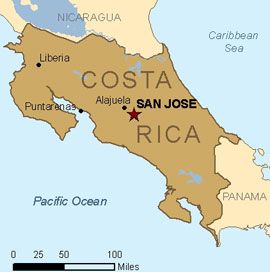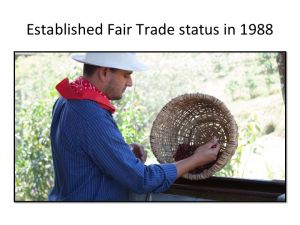Costa Rica (translated in English means “rich coast”) has established its coffee as being the most prestigious in the world, yet producers of coffee remain ignorant to the fair trade movement and impact it can have on their production.

The Global Exchange organization says that Costa Rica was the first country in Central America to register coffee as an export in 1840. Coffee is responsible for 11 percent of export revenues and employs five percent of the labor force which is 20 percent of the indigenous population.
With 4.7 million Costa Ricans living in a country, the size of West Virginia, the preservation of resources is of the utmost importance. Maintaining this industry is heavily dictated by the farmers who are responsible for keeping the soils integrity but who aren’t always informed on proper techniques. In a fair trade community there are opportunities for farmers to learn eco-friendly farming practices that don’t include pesticides or any alternating chemicals in production.
For a product like coffee, the other harvest season is short and if improperly managed can produce a mediocre product and limit the amount of global trade.
The Costa Rican government is environmentally conscious and is involved in the preservation of the biodiversity in the country. However, despite their regulations on the company’s affairs only a small population of producers have committed to following the Fair Trade model which ensures that the environment will not be negatively impacted during production.

In 2013 Cabrini College was recognized as being a fair trade higher education institution. A leader on campus who has upheld the integrity of fair trade practices is business professor Dr. Erin McLaughlin. McLaughlin is informed about the fair trade movement and the effects it has on developing countries. With a degree in marketing, a masters in business administration and doctorate degree in international business, her doctoral research focused on developing countries in Africa and the reasons why multinational corporations were not investing in Africa, despite the abundance of resources. McLaughlin attributed corruption to the main reasons why companies weren’t investing in the continent.
Since being at Cabrini McLaughlin has taken an active role in informing students about realities of a free trade market and the positive possibilities that can come from a fair trade society.
“I knew about fair trade and understood fair trade before I came to Cabrini but because of my background in business I was always taught free trade and capitalism in free market economics” McLaughlin said.
However, McLaughlin has always been open to an alternative model, something that would truly be free and included everyone in a truly free business model. “There is room for fair trade in a free trade model but I feel like I would support free trade unequivocally if it was fair and truly free,” McLaughlin said.
McLaughlin recently traveled along with a colleague, professor of marketing, Vonya Womack, and 16 Cabrini students to Costa Rica. The trip focused on fair trade and involved visiting plantations some that were fair trade and others that weren’t.
Sarapiqui cooperative was the fair trade plantation visited There, Cabrini students saw a fair trade cooperative maintaining a community with multiple types of revenue. Sarapiqui is an affiliate of the COOCAFE cooperative and has its own processing mill, markets its own packaged coffee and provide locals with reduced rates for farming goods. The differentiating details between COOCafe and other non fair trade plantations is that they maintained various productions that could maintain the plantation when it wasn’t in harvest season. They also introduced programs to educate farmers on ways to sustain bio-friendly plantation practices that posed little threat to the environment , establishing early education programs for youth in the community and opportunities for youth to attend college.

So why aren’t more companies in Costa Rica in support of Fair Trade?
This could be the million dollar question that students for Cabrini questioned when they traveled to the country. If the country is focused on creating environmentally positive companies and educating their citizens why not require agricultural based companies like coffee to follow the fair trade model.
Deborah Sick a researcher from the University of Ottawa published an article in the Latin American Research Review on fair trade certification in the coffee industry in Costa Rica. Sick’s research focuses on “farmers perception and drawbacks for production of fair trade in three coffee regions in Costa Rica.” Sicks states that in the late 1980’s Costa Rican government was support of farmers rights, supported cooperatives and provided financial investments in health care, education and infrastructure. All characteristics that implement a fair trade influence on the industry. She also conducted informative interviews with farmers to get their perspective on the movement. Many of them said they benefited both financially and organizationally.
The largest concern by cooperative owners was the cost of fair trade certification and the marketing opportunities within the network. Was the cost of certifying beneficial for community and worth the outrageous cost to farmers who only make up 1% of the coffee market. As the demand for organic grown coffee rises, fair trade organizations are requiring producers to maintain “sustainable production” which is an added cost in production for farmers.
“Even for a wealthier economy like Costa Rica fair trade has a place. Getting higher and higher levels of basic needs met for people in the community. And introducing more sustainable growing practices for the coffee industry,” said McLaughlin.
With trade opportunities between European countries increasing for coffee, there is a high demand for a socially stable and environmentally friendly coffee products. Today Costa Rica’s economy is supported more from tourism, microchip manufacturing and tropical fruits and flowers. However being fair trade certified in at-least the coffee industry would ensure that their products meet international requirements for trade and would support future market trade.



